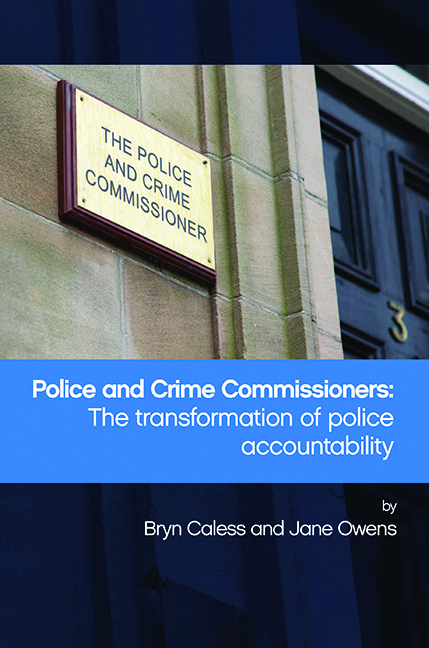Book contents
- Frontmatter
- Dedication
- Contents
- List of tables and figure
- Glossary of terms
- Acknowledgements
- Introduction
- one Governance: the Police and Crime Commissioner and police accountability in context
- two The psephology of the November 2012 election: motive, means and opportunity
- three Is the law on my side? Relationships between the PCC and the chief police officer team
- four Partners, colleagues or rivals for oversight? The (PCC) art of making friends and influencing people
- five “Putting yourself about”: PCCs, the media and the public
- six The debate with no end: PCCs’ remit and the problems of policing
- seven “I wonder if the game is worth the candle”: PCCs, their ‘work–life balance’ and their future
- General summary
- Bibliography
- Appendix Interview questionnaires
- Index
one - Governance: the Police and Crime Commissioner and police accountability in context
Published online by Cambridge University Press: 01 September 2022
- Frontmatter
- Dedication
- Contents
- List of tables and figure
- Glossary of terms
- Acknowledgements
- Introduction
- one Governance: the Police and Crime Commissioner and police accountability in context
- two The psephology of the November 2012 election: motive, means and opportunity
- three Is the law on my side? Relationships between the PCC and the chief police officer team
- four Partners, colleagues or rivals for oversight? The (PCC) art of making friends and influencing people
- five “Putting yourself about”: PCCs, the media and the public
- six The debate with no end: PCCs’ remit and the problems of policing
- seven “I wonder if the game is worth the candle”: PCCs, their ‘work–life balance’ and their future
- General summary
- Bibliography
- Appendix Interview questionnaires
- Index
Summary
The politicians of the centre right in England and Wales were in no doubt: police chief constables had to be made more accountable. The lead was given nationally in 2005 by Michael Gove MP, then Shadow Housing Spokesman, when he declared in The Times that:
The level of democratic accountability to which the police are subject in Britain today is woeful. (Gove, 2005)
A prominent Conservative theorist, who had headed the Policy Exchange think-tank and who had been formerly a Times columnist, Gove led the charge in 2005 against ‘failing chief constables’, because:
There is no adequate mechanism in Britain for holding a failing chief constable satisfactorily to account. […] Making chief constables directly accountable to a single individual elected to oversee their efforts would not be welcomed by all. Real accountability never is. But our weakest chief constables […] desperately need someone to put the fear of God into them. (Gove, 2005)
Three years later, writing in The Scotsman, Gove asserted that:
[T]he public deserve [sic] a say in deciding what the police's priorities should be.Whether it is directly electing the people who serve on police authorities and boards, or making the police chief in a given area directly accountable to the elected mayor, the methods can be debated but the direction of travel is clear – towards greater democracy. (Gove, 2008)
This notion of ‘direct accountability’ actually derives from elected commissioners of police in the United States, and Gove is here in line with a fine tradition of importing American policing methods into the UK. It followed with rather remorseless logic that his suggestion of a person who could ‘put the fear of God’ into chief constables in 2005 should become a ‘directly elected individual’ in 2008, and find its way into the Conservative Party manifesto as ‘a directly elected Police and Crime Commissioner’, two years later. By the time the Conservative Party had formed the majority in a coalition government with the Liberal Democrats in 2010, the suggestion of an elected person to hold the police directly to account had become policy and was a key part of the Queen's Speech.
- Type
- Chapter
- Information
- Police and Crime CommissionersThe Transformation of Police Accountability, pp. 11 - 36Publisher: Bristol University PressPrint publication year: 2016



